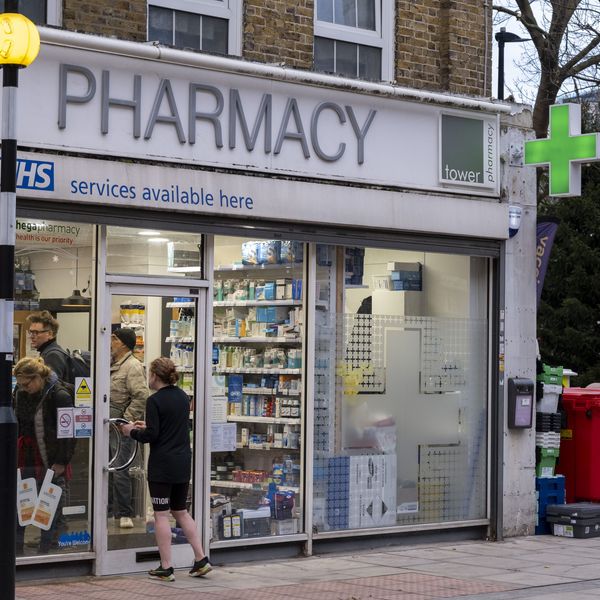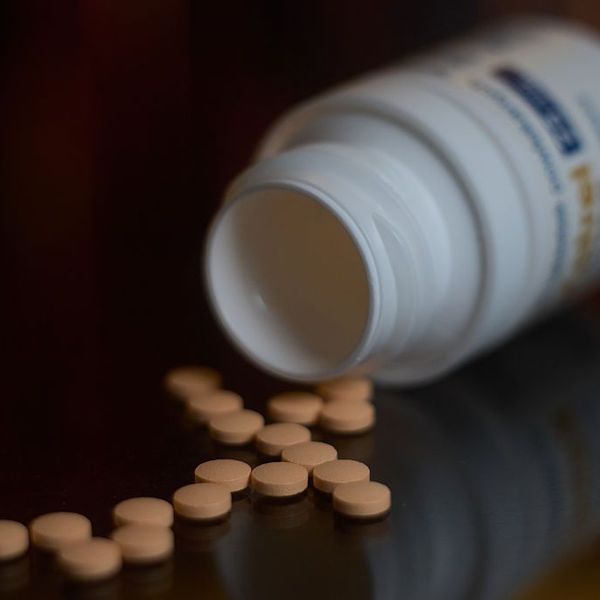It's Not Just Shkreli: Another Pharma Giant Hikes Drug Prices
Pfizer kicked off the New Year by quietly jacking up the costs of over 100 drugs
Former pharma CEO Martin Shkreli, widely reviled for dramatically hiking the price of a life-saving drug used by HIV and cancer patients, is in good company.
Starting at the beginning of 2016, the pharmaceutical giant Pfizer Inc. quietly jacked up the U.S. prices of over 100 of its drugs, some by nearly a fifth.
Reuters reported the findings on Friday, citing statistics from the information services company Wolters Kluwer that were included in a research note from by UBS Securities.
"UBS said Pfizer increased prices by 20 percent for anticonvulsant Dilantin, hormone therapy Menest, angina drug Nitrostat, Tykosyn for irregular heartbeat, and antibiotic Tygacil," Reuters noted.
"The analyst report said U.S. prices were raised on a total of 105 Pfizer drugs," the outlet continued. "No price reductions were reported."
Pfizer's drug hike is consistent with broad industry trends.
According to findings released in April by the firm Truveris, U.S. "branded, specialty and generic drugs rose a combined 3.8% in the first quarter [of 2015]."
Meanwhile, public health advocates are warning that mega "free trade" deals currently under negotiation, including the mammoth Trans-Pacific Partnership (TPP), are poised to spike drug prices even more--far beyond U.S. borders.
Judit Rius Sanjuan, U.S. manager and legal policy advisor for Doctors Without Borders, cautioned in October that "TPP countries have agreed to United States government and multinational drug company demands that will raise the price of medicines for millions by unnecessarily extending monopolies and further delaying price-lowering generic competition."
An Urgent Message From Our Co-Founder
Dear Common Dreams reader, The U.S. is on a fast track to authoritarianism like nothing I've ever seen. Meanwhile, corporate news outlets are utterly capitulating to Trump, twisting their coverage to avoid drawing his ire while lining up to stuff cash in his pockets. That's why I believe that Common Dreams is doing the best and most consequential reporting that we've ever done. Our small but mighty team is a progressive reporting powerhouse, covering the news every day that the corporate media never will. Our mission has always been simple: To inform. To inspire. And to ignite change for the common good. Now here's the key piece that I want all our readers to understand: None of this would be possible without your financial support. That's not just some fundraising cliche. It's the absolute and literal truth. We don't accept corporate advertising and never will. We don't have a paywall because we don't think people should be blocked from critical news based on their ability to pay. Everything we do is funded by the donations of readers like you. Will you donate now to help power the nonprofit, independent reporting of Common Dreams? Thank you for being a vital member of our community. Together, we can keep independent journalism alive when it’s needed most. - Craig Brown, Co-founder |
Former pharma CEO Martin Shkreli, widely reviled for dramatically hiking the price of a life-saving drug used by HIV and cancer patients, is in good company.
Starting at the beginning of 2016, the pharmaceutical giant Pfizer Inc. quietly jacked up the U.S. prices of over 100 of its drugs, some by nearly a fifth.
Reuters reported the findings on Friday, citing statistics from the information services company Wolters Kluwer that were included in a research note from by UBS Securities.
"UBS said Pfizer increased prices by 20 percent for anticonvulsant Dilantin, hormone therapy Menest, angina drug Nitrostat, Tykosyn for irregular heartbeat, and antibiotic Tygacil," Reuters noted.
"The analyst report said U.S. prices were raised on a total of 105 Pfizer drugs," the outlet continued. "No price reductions were reported."
Pfizer's drug hike is consistent with broad industry trends.
According to findings released in April by the firm Truveris, U.S. "branded, specialty and generic drugs rose a combined 3.8% in the first quarter [of 2015]."
Meanwhile, public health advocates are warning that mega "free trade" deals currently under negotiation, including the mammoth Trans-Pacific Partnership (TPP), are poised to spike drug prices even more--far beyond U.S. borders.
Judit Rius Sanjuan, U.S. manager and legal policy advisor for Doctors Without Borders, cautioned in October that "TPP countries have agreed to United States government and multinational drug company demands that will raise the price of medicines for millions by unnecessarily extending monopolies and further delaying price-lowering generic competition."
Former pharma CEO Martin Shkreli, widely reviled for dramatically hiking the price of a life-saving drug used by HIV and cancer patients, is in good company.
Starting at the beginning of 2016, the pharmaceutical giant Pfizer Inc. quietly jacked up the U.S. prices of over 100 of its drugs, some by nearly a fifth.
Reuters reported the findings on Friday, citing statistics from the information services company Wolters Kluwer that were included in a research note from by UBS Securities.
"UBS said Pfizer increased prices by 20 percent for anticonvulsant Dilantin, hormone therapy Menest, angina drug Nitrostat, Tykosyn for irregular heartbeat, and antibiotic Tygacil," Reuters noted.
"The analyst report said U.S. prices were raised on a total of 105 Pfizer drugs," the outlet continued. "No price reductions were reported."
Pfizer's drug hike is consistent with broad industry trends.
According to findings released in April by the firm Truveris, U.S. "branded, specialty and generic drugs rose a combined 3.8% in the first quarter [of 2015]."
Meanwhile, public health advocates are warning that mega "free trade" deals currently under negotiation, including the mammoth Trans-Pacific Partnership (TPP), are poised to spike drug prices even more--far beyond U.S. borders.
Judit Rius Sanjuan, U.S. manager and legal policy advisor for Doctors Without Borders, cautioned in October that "TPP countries have agreed to United States government and multinational drug company demands that will raise the price of medicines for millions by unnecessarily extending monopolies and further delaying price-lowering generic competition."

